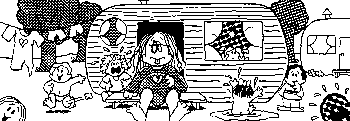![[Metroactive Books]](/books/gifs/books468.gif)
![[Metroactive Books]](/books/gifs/books468.gif)
[ Books Index | Metro | Metroactive Central | Archives ]
The Joy of Dissing
'Dilbert' creator Scott Adams stoops to redbaiting in 'Joy of Work'; Richard Marcej puts down the daily comics
HATE MAIL comes in two forms. The first form is direct criticism of some point you've made or position you've taken. A sample: a letter calling you a flint-heart for not weeping over Leonardo DiCaprio's latest death scene. This sort of letter is fair enough. Plus it's flattering to have been noticed among all of the competition for a reader's attention.
The second sort of hate letter is more wounding. It might mock your parentage, your face or your name--all factors pretty much out of your hands, all factors immaterial to the argument. An example: a letter I got accusing me of Prussianism for not joining in on the celebration of Saving Private Ryan.
Eventually, it amused me to be thought of as monocled, shaven-headed and Heidelberg-scarred. I considered posting a picture of Jay Ward's Rocky and Bullwinkle cartoon character Fearless Leader on my Web page as a self-portrait. That calmer reaction came in the long run; in the short run, being insulted about your name puts you back in mind of schoolyard taunts. And there you are, without a dodge ball in your hands, dammit.
Scott Adams' latest bestseller is The Joy of Work: Dilbert's Guide to Finding Happiness at the Expense of Your Co-Workers (Harper Business; 264 pages; $22). Adams is the creator of Dilbert, one of the Western world's most successful cartoon franchises. Loose isn't the word for The Joy of Work, a collection of cartoons stitched together with anecdotes.
Adams spends the final pages of the book rejoindering Norman Solomon's The Trouble With Dilbert (Common Courage Press), in which Solomon pointed out some tendencies in Adams' work that don't jibe with the cartoonist's pose as the pal of the oppressed cubical dweller. Solomon stressed, for instance, that Adams--according to an interview in Newsweek, later confirmed by Adams in an email to Solomon--was in favor of downsizing.
In response, Adams accuses Solomon of being like Rosanne Rosanna-Dana, Gilda Radner's commentator on Saturday Night Live. (Rosanne was a woman given to rambling essays based on misheard information.) Adams says he was quoted out of context, that his Dilbert always comes out against downsizing. Indeed his cartoon characters are usually overworked and stressed out because of understaffing. "It's what I talk about all the time in Dilbert," Adams says.
Fair enough, but then Adams decides to conduct an imaginary interview with Solomon, using his evil dog cartoon character Dogbert as a, um, cat's paw. "Solomon," who can only sputter "um, ers" in response, is grilled by Dogbert. What exactly is Solomon's alternative to downsizing, Dogbert wants to know: "Does it start with a 'C' and end with the fall of the Iron Curtain?" The word, of course, is communism.
There's our choice as Adams sees it: downsizing or red communism. Adams is still within the bounds of a debate, even though he's made himself look very simple-minded for a man with such a high reputation as a management consultant. (Didn't HarperCollins used to have a lot of editors who would prevent this kind of self-inflicted embarrassment? Where were they? Did they all get downsized?)
Now Dogbert dispenses with the political slurs and gets personal with "Solomon." He says, "Your head looks like a mushroom with fur ... have you considered renting your head out as a pot scrubber for large hotels?"
Certainly, Adams is entitled to answer Solomon any way he likes. In Dilbert, there's a Larry Fine-coiffeured boss character. It's the cartoonist's bread and butter to draw funny-looking pictures. So maybe in the heat of the moment Adams forgot that there's a different sort of approach when you're dealing with real human beings. But why am I giving Scott Adams writing advice? He's made zillions off of these nonbooks of his, and all I have is a moldy pile of hate letters--and far too few of those, at that.
THAT DILBERT is considered the leading light in the daily papers says a lot about the fate of the daily cartoon page. Here's the popular art form that went from promising youth to senile decadence in 100 short years. Bastard Tales by Richard Marcej (Baboon Comics; $2.95) includes the comic-strip story "Why the Hell Won't They Just Go Away?"
It's about the combination of rage and despair the funny pages can make novelty lovers feel as they are confronted once again with the vision of Cathy trying to squeeze into a swimsuit or scorched by yet another brush with magical realism in The Family Circus, that tribe of no-neck children growing up haunted by the spirits of their ancestors. (Grandma, Grandpa, Ida No, Not Me--it's all kind of like Beloved, isn't it?) Marcej offers some Mad Magazine-style suggestions on how to finish these series once and for all.
It's funny stuff, but Marcej needs to avoid his television set. He's running the risk of becoming the budding newspaper columnist described by Tom Wolfe, who, if not careful, produces columns that "glow blue with television." As for Scott Adams, he's obviously ready for TV--he has all of the glib arguments the medium thrives upon.
[ San Jose | Metroactive Central | Archives ]
![]()

The Parallel Cathy: In ' Bastard Tales' Richard Marcej spoofs some favorite comic strips.
From the November 5-11, 1998 issue of Metro.